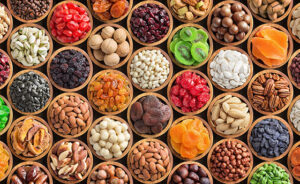 Israelis separate their munchies into pitzuhim and hatifim. Pitzuhim are (literally) “things that can be cracked”; i.e., nuts and seeds. Hatifim, literally “things that can be grabbed,” are all sorts of chips and other salty snacks. To complicate matters, there is a type of salty snack that Israelis call “monchies,” which is a spicy mixture of puffed rice and peanuts. This column is dedicated to pitzuhim. Hatifim, the basic subsistence food for many Israeli children, will have to wait a while before it is given its due.
Israelis separate their munchies into pitzuhim and hatifim. Pitzuhim are (literally) “things that can be cracked”; i.e., nuts and seeds. Hatifim, literally “things that can be grabbed,” are all sorts of chips and other salty snacks. To complicate matters, there is a type of salty snack that Israelis call “monchies,” which is a spicy mixture of puffed rice and peanuts. This column is dedicated to pitzuhim. Hatifim, the basic subsistence food for many Israeli children, will have to wait a while before it is given its due.
Pitzuhim may grace any refreshment table in Israel, and they have a special place of honor during the dessert course of a festive meal. While my seed-extraction method is cumbersome (crack the seed with my teeth and then extract it with my fingers), many Israelis are quite skilled shellers; they can put one or more seeds in their mouths, spit out the shell and swallow the seed. They can even do this with watermelon seeds, which for non-natives are quite a time-consuming ordeal and definitely not worth the effort.
Please be warned that it is easy to get totally absorbed in one’s pitzuhim. It is not uncommon to hypnotically plow through whatever sized bag of pitzuhim is on the table. An Israeli friend of mine, upon being offered sunflower seeds (the most popular pitzuhim) said, “I like them, but I don’t want to start because then I can’t stop.”
Judging from the usual crowded line-up of people before their store, Moreno is the most popular pitzuhim seller in Jerusalem’s shuk. Moreno sells both shelled and unshelled pitzuhim, raw and roasted. They do their own roasting on the spot. Many of their popular pitzuhim are more sugary than salty, as in sugar-covered peanuts, almonds, cashews, and pecans.
In our home, up until recently, the name Moreno was synonymous with pitzuhim. However, a funny thing happened in the life of our pitzuhim eating. On a few occasions we were not able to get to the shuk before the weekend and rather than enter into a Shabbat pitzuhim-less, we bought Yuri Ya’akobi’s packaged pistachios and pumpkin seeds from our local grocery store (“finely roasted, Kurdish style, since 1924”). We found Yuri’s pitzuhim to be quite good—indeed, as good as Moreno’s on a good day. And there’s the rub. Because Moreno’s quality, I’m sorry to say, is less than those lines in front would lead one to expect (although Moreno’s pitzuhim are significantly cheaper than the packaged varieties). Perhaps we shouldn’t have been surprised at this; after all, pitzuhim quality control at an open-air market (especially during hot months) is going to be challenging, and year-round there’s always the problem of those fingers dipping in for free samples.
Yes, sacrilegious as it may sound, our family has slowly but surely been won over by Yuri Ya’akobi’s store-bought pitzuhim. And Yuri Ya’akobi’s motto has finally hit home: “You Don’t Take Chances With Pitzuhim” (enlarged and enreddened in the original). Because I realized, good G-d, that that’s what we had been doing. For years and years we had been buying our pitzuhim at Moreno’s and taking our chances as to whether or not the pistachios would really crunch or not. No more. Life is too short. Now I understand the wisdom of the great (and I presume late) Yuri Ya’akobi. You buy his product and every nut is good every time. In this unpredictable world, why take unnecessary chances? G-d bless that Kurdish man.
TEDDY WEINBERGER is director of development for a consulting company called Meaningful. He made aliyah with his family in 1997 from miami, where he was an assistant professor of religious studies. Teddy and his wife, sarah jane ross, have five children.






